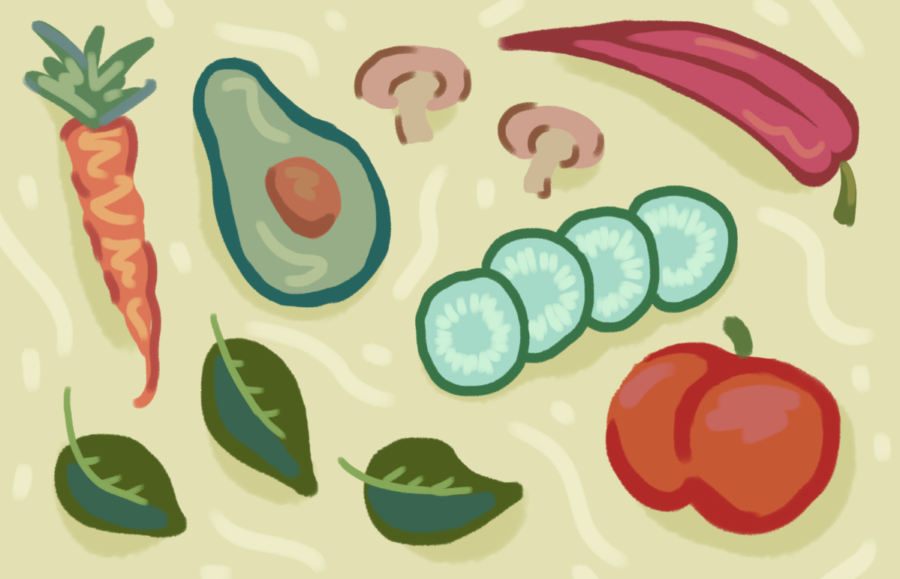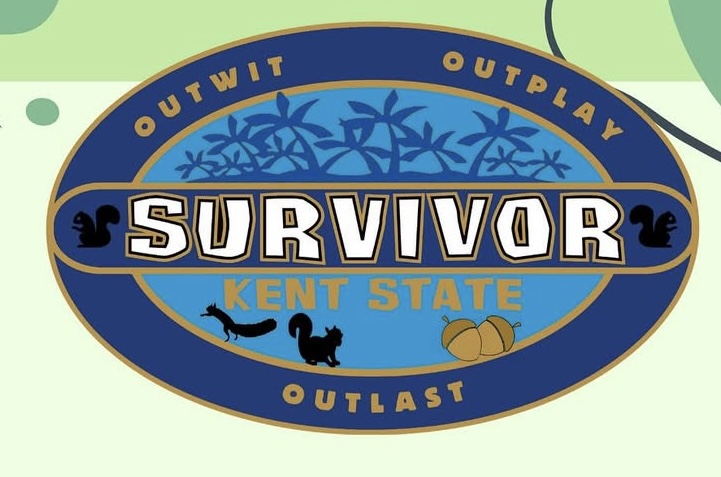Illustration by Abigail Pickens
With new diets becoming popular among Americans, vegetarianism has been and continues to be a staple diet for millions.
In a 2018 poll from Gallup, about 5% of Americans identify as some type of vegetarian. Those 18 to 34 years of age are more likely to be vegetarian than those 55 and older.
But why cut out meat?
For many, just the thought of cutting meat from their diet seems daunting. Sophomore fashion merchandising major Kristen Kubek says taking a gradual approach into a vegetarian diet worked for her.
“It was really a four or five-year process for me,” Kubek says. “It was definitely a gradual process for me, and I feel like when people try to rush into it, that’s when they end up going back to eating meat.”
Registered dietitian, Kent State professor and Director of the Dietetic Internship Program Emily Baker also recommends taking a gradual approach to vegetarianism, like dedicating days each week to not eating meat or incorporating more plant-based protein into your diet.
“I always suggest people start experimenting with reducing their animal proteins and animal products maybe two or three times a week and then start increasing that,” Baker says. “Sometimes if you do it slowly so that you can figure out what type of vegetarianism works best for you, it is a little bit more manageable.”
There are a number of different types of vegetarians, Baker says.
“Vegetarianism includes the exclusion of animal proteins at some level,” Baker says. “Some individuals just choose to not eat red meat. Some individuals don’t eat any meat products … but they will consume fish … Then we have individuals who don’t eat any animal proteins, but they might include milk and eggs and so … those would be lacto-ovo vegetarians.”
Baker tells people considering a vegetarian diet to be “educated” vegetarians, ensuring they incorporate a variety of fruits and vegetables, whole grains and consume enough vitamins, minerals and protein.
“Soy products tend to be more what we call biological complete proteins, and that means they contain all the amino acids that our bodies need,” Baker says. “Anytime we can choose whole grain products, that’s going to be preferred … Fruits and vegetables of all sorts … Nuts and nut butters … those are really nice sources of calories.”
There are a number of different health benefits to having a vegetarian diet. The Academy of Nutrition and Dietetics says those who have plant-based diets are at a lower risk of health conditions like heart disease, stroke, type 2 diabetes, high blood pressure, some types of cancer and obesity.
For students like freshman political science major Isobel Day, learning about the effects of methane production from factory farming has on the environment and climate made her want to stop eating meat.
“I’ve really been more connected to nature,” Day says. “I’m paying more attention to what I’m putting in my body, and so I’m kind of connecting myself to nature and to the world around me.”
In the United States, livestock farms produce around 70% of the nation’s ammonia emissions. These emissions contribute heavily to climate change, especially methane.
Environmentalism plays a role in many people’s decision to cut out meat. According to the Vegetarian Society, eating a vegetarian diet produces 2.5 times less carbon emissions than a diet with meat.
The idea of learning how to cook plant-based proteins like tofu and tempeh can be nerve-wracking for some, but Kubek says there are many easy ways to cook these proteins.
“Part of being a vegetarian is, preparing to be a vegetarian,” Kubek says. “Gathering up recipes ahead of time … and really, like, figure out how to prepare tofu … I definitely recommend not just rushing into it. You have to have a plan.”
If you are considering trying a more restrictive diet, Baker highly recommends that you speak with a registered dietitian to discuss how to make sure you are getting the necessary nutrients for your body.
“If you’re able to, talk to a registered dietitian to make sure that you are that ‘educated’ vegetarian and make sure that you’re getting all that your body needs to be healthful and to function the way that your body is designed to function.”
















